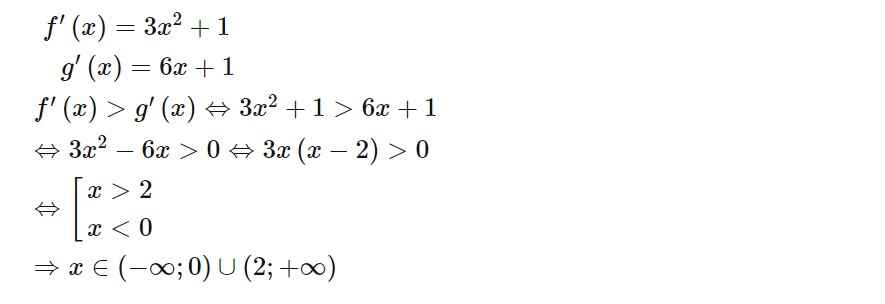Hãy nhập câu hỏi của bạn vào đây, nếu là tài khoản VIP, bạn sẽ được ưu tiên trả lời.

Lời giải:
a) Ta có f'(x) = 3x2 + 1, g(x) = 6x + 1. Do đó
f'(x) > g'(x) <=> 3x2 + 1 > 6x + 1 <=> 3x2 - 6x >0
<=> 3x(x - 2) > 0 <=> x > 2 hoặc x > 0 <=> x ∈ (-∞;0) ∪ (2;+∞).
b) Ta có f'(x) = 6x2 - 2x, g'(x) = 3x2 + x. Do đó
f'(x) > g'(x) <=> 6x2 - 2x > 3x2 + x <=> 3x2 - 3x > 0
<=> 3x(x - 1) > 0 <=> x > 1 hoặc x < 0 <=> x ∈ (-∞;0) ∪ (1;+∞).

a/ \(cosx-cos2x+sin2x-sinx=3-4cosx\)
\(\Leftrightarrow2sinx.cosx-sinx-2cos^2x+5cosx-2=0\)
\(\Leftrightarrow sinx\left(2cosx-1\right)-\left(2cosx-1\right)\left(cosx-2\right)=0\)
\(\Leftrightarrow\left(2cosx-1\right)\left(sinx-cosx+2\right)=0\)
\(\Leftrightarrow\left[{}\begin{matrix}2cosx-1=0\\sinx-cosx=-2\end{matrix}\right.\) \(\Leftrightarrow\left[{}\begin{matrix}cosx=\frac{1}{2}\\sin\left(x-\frac{\pi}{4}\right)=-\sqrt{2}< -1\left(vn\right)\end{matrix}\right.\)
\(\Rightarrow x=\pm\frac{\pi}{3}+k2\pi\)
b/ ĐKXĐ: \(\left\{{}\begin{matrix}cosx\ne0\\sin\left(x+\frac{\pi}{3}\right)\ne0\end{matrix}\right.\) \(\Rightarrow...\)
\(\frac{2cos^2x+\sqrt{3}sin2x+3}{2cos^2x.sin\left(x+\frac{\pi}{3}\right)}=\frac{3}{cos^2x}\)
\(\Leftrightarrow2cos^2x+2\sqrt{3}sinx.cosx+3=3\left(sinx+\sqrt{3}cosx\right)\)
\(\Leftrightarrow2cos^2x-3\sqrt{3}cosx+3+2\sqrt{3}sinx.cosx-3sinx=0\)
\(\Leftrightarrow\left(2cosx-\sqrt{3}\right)\left(cosx-\sqrt{3}\right)+\sqrt{3}sinx\left(2cosx-\sqrt{3}\right)=0\)
\(\Leftrightarrow\left(2cosx-\sqrt{3}\right)\left(cosx+\sqrt{3}sinx-\sqrt{3}\right)=0\)
\(\Leftrightarrow\left[{}\begin{matrix}cosx=\frac{\sqrt{3}}{2}\\sin\left(x+\frac{\pi}{6}\right)=\frac{\sqrt{3}}{2}\end{matrix}\right.\) \(\Rightarrow...\)

Bạn tự hiểu là giới hạn tiến đến đâu nhé, làm biếng gõ đủ công thức
a. \(\frac{\sqrt{1+x}-1+1-\sqrt[3]{1+x}}{x}=\frac{\frac{x}{\sqrt{1+x}+1}-\frac{x}{1+\sqrt[3]{1+x}+\sqrt[3]{\left(1+x\right)^2}}}{x}=\frac{1}{\sqrt{1+x}+1}-\frac{1}{1+\sqrt[3]{1+x}+\sqrt[3]{\left(1+x\right)^2}}=\frac{1}{2}-\frac{1}{3}=\frac{1}{6}\)
b.
\(\frac{1-x^3-1+x}{\left(1-x\right)^2\left(1+x+x^2\right)}=\frac{x\left(1-x\right)\left(1+x\right)}{\left(1-x\right)^2\left(1+x+x^2\right)}=\frac{x\left(1+x\right)}{\left(1-x\right)\left(1+x+x^2\right)}=\frac{2}{0}=\infty\)
c.
\(=\frac{-2}{\sqrt[3]{\left(2x-1\right)^2}+\sqrt[3]{\left(2x+1\right)^2}+\sqrt[3]{\left(2x-1\right)\left(2x+1\right)}}=\frac{-2}{\infty}=0\)
d.
\(=x\sqrt[3]{3-\frac{1}{x^3}}-x\sqrt{1+\frac{2}{x^2}}=x\left(\sqrt[3]{3-\frac{1}{x^3}}-\sqrt{1+\frac{2}{x^2}}\right)=-\infty\)
e.
\(=\frac{2x^2-8x+8}{\left(x-1\right)\left(x-2\right)\left(x-2\right)\left(x-3\right)}=\frac{2\left(x-2\right)^2}{\left(x-1\right)\left(x-3\right)\left(x-2\right)^2}=\frac{2}{\left(x-1\right)\left(x-3\right)}=\frac{2}{-1}=-2\)
f.
\(=\frac{2x}{x\sqrt{4+x}}=\frac{2}{\sqrt{4+x}}=1\)

\(L_1=\lim\limits_{x\rightarrow0}\frac{x\left(x^2+3x-2\right)}{x\left(x^4+4\right)}=\lim\limits_{x\rightarrow0}\frac{x^2+3x-2}{x^4+4}=-\frac{1}{2}\)
\(L_2=\lim\limits_{x\rightarrow+\infty}\frac{1-\frac{3}{x^2}+\frac{2}{x^3}}{\left(\frac{4}{x}-2\right)^3}=\frac{1}{\left(-2\right)^3}=-\frac{1}{8}\)
\(L_3=\lim\limits_{x\rightarrow-1}\frac{\left(2x+1\right)\left(x+1\right)}{x\left(x+1\right)}=\lim\limits_{x\rightarrow-1}\frac{2x+1}{x}=1\)
\(L_4=\lim\limits_{x\rightarrow2}\frac{x^2-4x+1}{4-x^2}=\frac{1}{0}=+\infty\)
\(L_5=\lim\limits_{x\rightarrow3}\frac{\sqrt{x+1}-2}{x-2}=\frac{0}{1}=0\)
\(L_6=\lim\limits_{x\rightarrow1}\frac{x+3-\left(x+1\right)^2}{\left(x-1\right)\left(x+1\right)\left(\sqrt{x+3}+x+1\right)}=\lim\limits_{x\rightarrow1}\frac{-\left(x-1\right)\left(x+2\right)}{\left(x-1\right)\left(x+1\right)\left(\sqrt{x+3}+x+1\right)}\)
\(=\lim\limits_{x\rightarrow1}\frac{-\left(x+2\right)}{\left(x+1\right)\left(\sqrt{x+3}+x+1\right)}=\frac{-3}{2.4}=-\frac{3}{8}\)
\(L_7=\lim\limits_{x\rightarrow+\infty}\frac{x^2+x+1-\left(x-1\right)^2}{\sqrt{x^2+x+1}+x-1}\lim\limits_{x\rightarrow+\infty}\frac{3x}{\sqrt{x^2+x+1}+x-1}=\lim\limits_{x\rightarrow+\infty}\frac{3}{\sqrt{1+\frac{1}{x}+\frac{1}{x^2}}+1-\frac{1}{x}}=\frac{3}{2}\)
\(L_8=\lim\limits_{x\rightarrow-\infty}\frac{x^2+x+1-\left(3x-2\right)^2}{\sqrt{x^2+x+1}+3x-2}=\lim\limits_{x\rightarrow-\infty}\frac{-8x^2+13x-3}{\sqrt{x^2+x+1}+3x-2}=\lim\limits_{x\rightarrow-\infty}\frac{-8+\frac{13}{x}-\frac{3}{x^2}}{-\sqrt{1+\frac{1}{x}+\frac{1}{x^2}}+3-\frac{2}{x}}=\frac{-8}{-1+3}=-4\)

1d.
Đề ko rõ
1e.
\(\Leftrightarrow\left(4cos^3x-3cosx\right)^2.cos2x-cos^2x=0\)
\(\Leftrightarrow cos^2x\left(4cos^2x-3\right)^2.cos2x-cos^2x=0\)
\(\Leftrightarrow cos^2x\left(2cos2x-1\right)^2cos2x-cos^2x=0\)
\(\Leftrightarrow cos^2x\left[\left(2cos2x-1\right)^2.cos2x-1\right]=0\)
\(\Leftrightarrow cos^2x\left(4cos^32x-4cos^22x+cos2x-1\right)=0\)
\(\Leftrightarrow cos^2x\left(cos2x-1\right)\left(4cos^22x+1\right)=0\)
\(\Leftrightarrow\left[{}\begin{matrix}cosx=0\\cos2x=1\end{matrix}\right.\) \(\Leftrightarrow...\)
2b.
Đề thiếu
2c.
Nhận thấy \(cos2x=0\) ko phải nghiệm, chia 2 vế cho \(cos^32x\)
\(\frac{8sin^22x}{cos^22x}=\frac{\sqrt{3}sin2x}{cos2x}.\frac{1}{cos^22x}+\frac{1}{cos^22x}\)
\(\Leftrightarrow8tan^22x=\sqrt{3}tan2x\left(1+tan^22x\right)+1+tan^22x\)
\(\Leftrightarrow\sqrt{3}tan^32x-7tan^22x+\sqrt{3}tan2x+1=0\)
\(\Leftrightarrow\left[{}\begin{matrix}tanx=\frac{1}{\sqrt{3}}\\tanx=\sqrt{3}-2\\tanx=\sqrt{3}+2\end{matrix}\right.\)
\(\Leftrightarrow...\)

Đề bài sai, phương trình này ko giải được (theo kiến thức phổ thông)